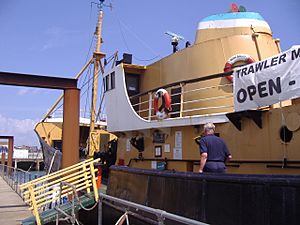Mincarlo (trawler) facts for kids
 |
|
Quick facts for kids History |
|
|---|---|
| Name | Mincarlo |
| Owner |
|
| Port of registry | Lowestoft |
| Builder | Brooke Marine, Lowestoft |
| Cost | £76,600 |
| Yard number | Yard 281 |
| Laid down | 1960 |
| Launched | 25 September 1961 |
| In service | 28 years |
| Identification |
|
| Status | Museum ship: floating |
| Notes | Sold to the Lydia Eva Trust for £1 and then preserved. |
| General characteristics | |
| Class and type | Sidewinder trawler |
| Tonnage | 166 grt, 56 net |
| Length | 108.75 ft (33.15 m) |
| Beam | 22.7 ft (6.9 m) |
| Depth | Moulded: 11.25 ft (3.43 m) |
| Installed power | Engine No: 117 by AK Diesels Ltd: 5-cylinder, vertical, 4 stroke cycle, naturally aspirated, developing 500 shp continuously at 320 revs. Driving through an AK Diesel 2:1 ratio reverse reduction gearbox to give a propeller speed of approximately 160rpm. |
| Speed | 10 knots (19 km/h) |
| Crew | 11 |
| Notes |
|
Mincarlo is a special ship. She is the last "sidewinder" fishing trawler left from the old Lowestoft fishing fleet. She is also the last fishing boat built in Lowestoft that still has an engine made right there in the town.
Contents
Building the Mincarlo
The Mincarlo was built in 1961. She was made at the Brooke Marine shipyards in Lowestoft, a town in Suffolk, England. She was one of three "sister ships" built for a company called W.H. Podd Ltd.
The other two ships were named Bryher and Rosevear. The Podd family named all three ships after small islands. These islands are part of the Isles of Scilly, which are off the Cornish coast. Each of these ships cost £75,600 to build.
How Sidewinder Trawlers Fish
The Mincarlo was a type of fishing boat called a "sidewinder" or "side trawler." On these boats, the large trawl nets were put into the water over the side of the ship. Strong ropes, called trawl warps, went through special blocks hanging from two "gallows."
On the Mincarlo, these gallows were at the front and back, on the right (starboard) side. The fishing equipment included two "otter trawls." Each of these had "otter boards" attached. These boards were shaped to spread out and keep the net's mouth open as it was pulled along the seabed.
The nets were also connected to heavy ropes, about 40 feet (12 m) long. These ropes kept the nets on the seabed. They also helped to stir up any fish hiding in the sand. Until the late 1960s, sidewinder trawlers were the most common deep-sea boats. They were used for a long time in the North Atlantic Ocean.
Mincarlo's Working Life
The Mincarlo was part of Lowestoft's fishing fleet, which had about 50 to 60 boats. For 13 years, her catches were among the best in the fleet. She caught fish like cod, haddock, plaice, skate, and sole.
W. H. Podd Ltd owned her until 1975. Then, a company called Putford Enterprises bought her. Putford Enterprises owned many fishing boats in Lowestoft and Grimsby. They also operated many safety standby ships. These ships helped the offshore oil and gas industry in the southern North Sea.
In 1977, the Mincarlo was changed to become a standby vessel. She started a new job helping out in the busy southern North Sea gas fields. She was also given a new name: Putford Merlin.
After 28 years of work, she was replaced in 1989. A new ship, built just for standby work, took her place. The Mincarlo was then stored back at the Brooke Marine yard where she was built.
Restoration and Museum Life
After her working life, Putford Enterprise sold the Mincarlo to the Lydia Eva Trust Ltd. They paid only £1 for her! After some repairs and cleaning, the Mincarlo opened to the public in 1998.
Today, you can visit the Mincarlo at Lowestoft Heritage Quay. Sometimes, she is moved to South Quay at Great Yarmouth. You can visit her for free.
The Mincarlo is now owned by the Lydia Eva and Mincarlo Charitable Trust Ltd. This is a registered charity. This trust also owns another preserved fishing boat, the Lydia Eva, which is a herring drifter.
In early 2015, the Mincarlo was undergoing more repairs and restoration. A company called AKD Engineering, based in Lowestoft, did this work for free. It was part of their 60th anniversary celebration.
Gallery
See also
- Excelsior - last surviving Lowestoft fishing smack
 | James B. Knighten |
 | Azellia White |
 | Willa Brown |










